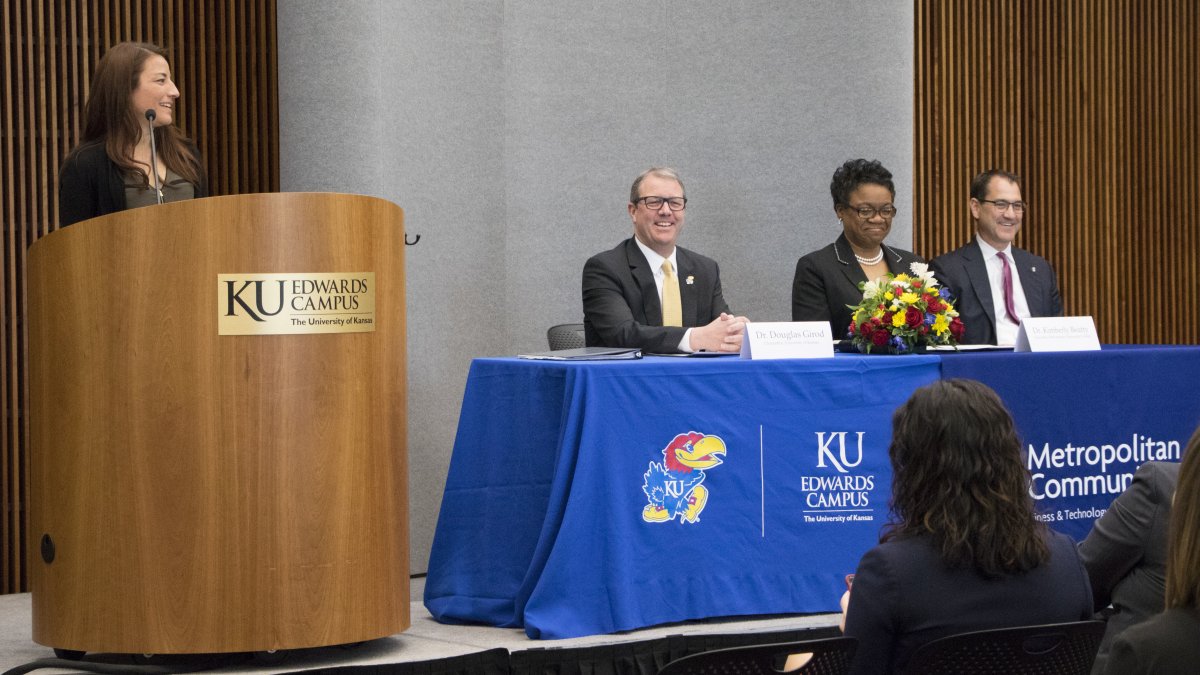MCC, KU Sign Agreement Advancing Pathways for Kansas City Students

OVERLAND PARK (April 24, 2018) – A new agreement between the University of Kansas (KU) and Metropolitan Community College (MCC) significantly reduces the financial and time commitment barriers that community college students face in completing their education at a four-year institution.
An associate degree from MCC now satisfies KU Core requirements 1-3, streamlining a pathway to a KU bachelor’s degree.
“This agreement gives our students more options and knocks roadblocks out of the way,” said MCC Chancellor Kimberly Beatty, Ed.D. “It’s also an example of how MCC and KU are working across state lines to save students time and money.”
Higher education, K-12 and community leaders from both sides of the state line gathered to witness Beatty and KU Chancellor Douglas A. Girod, M.D., sign a proclamation during a historic event on April 23 at the KU Edwards Campus (KUEC) in Overland Park.
“I believe this agreement will give renewed vitality to the process of obtaining a degree for students in the Kansas City metro area,” said Jessica Hammer, exercise science student at the KU Edwards Campus who transferred from MCC. “It benefits students by allowing them to complete their education with flexibility and affordability through a partnership that prioritizes student success."
Many community college students, like Hammer, come from local community colleges to complete their degree at KUEC. The agreement with MCC is a continuation of KU’s close relationships with area community colleges.
“MCC and other community college students have succeeded at KU and the Edwards Campus for many years,” said KUEC Vice Chancellor David Cook, Ph.D. “This proclamation makes their transition smoother and potentially less costly. We’re excited to serve more of them and, by extension, further serve the Kansas City Metro.”
Two of the largest education systems in the area, MCC and KU share similar missions to build the Kansas City workforce, foster lifelong learning and equip students with the tools they need to succeed. This new pathway, along with KU’s MetroKC rate at its Edwards Campus, delivers an attainable way for Kansas Citians to further their education and advance their careers.
KU, whose 2017 freshman class included 1,082 transfer students, is one of 112 colleges and universities named to Phi Theta Kappa’s Transfer Honor Roll, which identifies the top four-year colleges and universities for creating dynamic pathways to support community college transfer.
“It is not only our responsibility to provide high-quality education, but also to increase access for students,” Girod said. “As a former community college student, I can personally vouch for the value in supportive pathways throughout one’s educational journey. We are thrilled to formally work with MCC to provide more tools for student success.”
See a Facebook Live recording of the event.
About Metropolitan Community College
Metropolitan Community College (MCC) is one college with five campuses. MCC is Kansas City’s oldest and largest public institution of higher education; 2017-18 marks our 103rd academic year. The College was founded in 1915 as the Kansas City Polytechnic Institute. In 1919 it became known as the Junior College of Kansas City. Our campuses — MCC-Blue River, MCC-Business & Technology, MCC-Longview, MCC-Maple Woods and MCC-Penn Valley — and a robust online program educate more than 30,000 students annually through credit and noncredit courses and business services.
About The University of Kansas
The University of Kansas is a major comprehensive research and teaching university. Its mission is to lift students and society by educating leaders, building healthy communities and making discoveries that change the world. The KU Edwards Campus at 127th Street and Quivira Road in Overland Park brings the high-quality academic, professional and continuing education programs as well as research and public-service benefits of KU to the Greater Kansas City community in order to serve the workforce, economic and community development needs of the region.





